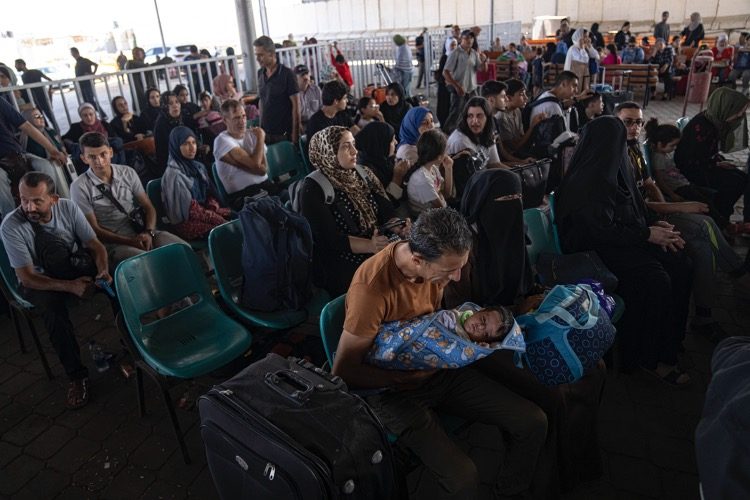
On October 28, Israeli culture magazine Mekomit released a leaked document allegedly issued by Israel’s Ministry of Intelligence proposing an Israeli occupation of Gaza and complete displacement of its 2.3 million inhabitants to Egypt’s Sinai Peninsula.
The document, published on 13 October, laid out a blueprint to evacuate all residents of the Gaza Strip to North Sinai as the favored choice among three options regarding the Palestinians in Gaza at the end of the present conflict between Israel and the Hamas terrorist group.
Notably, these leaked documents suggested that Israel transfer the Gazan population to Sinai during the war, set up tent cities and new cities in northern Sinai for these displaced people, and subsequently set up a sealed security zone stretching several kilometers inside Egypt. On their end, the deported Palestinians would be banned from returning to any areas near the Israeli border.
The Ministry of Intelligence, led by Gila Gamliel of the Likud party, does not oversee any of Israel’s intelligence agencies, but independently prepares studies and policy papers, which are disseminated among members of the Israeli government and government security bodies.
It is crucial to bear in mind that the presence of this document does not mean that Israeli security forces are necessarily enforcing its suggestions.
Nonetheless, recent remarks by Israeli government officials and Israeli military actions in Gaza seem to hint that such a plan is indeed being meted out. Since 7 October, Israeli officials have repeatedly given warnings to Palestinians to evacuate to southern Gaza prior to an impending Israeli ground invasion.
The document unequivocally and explicitly suggested carrying out a transfer of civilians from Gaza as the desired outcome of the Israel-Hamas war.
According to the document, Israel’s transfer plan can be separated into various stages. During the first phase, the Palestinian population in Gaza must be coerced to evacuate to southern Gaza, while Israeli air strikes will concentrate on targets in northern Gaza.
During the second phase, Israel would launch a ground invasion of Gaza, leading to an occupation of the entire strip from north to south, as well as the “cleansing of the underground bunkers from Hamas fighters.”
Simultaneously, Gaza citizens would have to be transferred to Egyptian territory and would be forbidden from ever returning.
“It is important to leave the traffic lanes towards the south usable, to allow the evacuation of the civilian population towards Rafah,” the document read.
Furthermore, the plan also called for Israel to start a dedicated campaign to “motivate” Gazans “to agree to the plan” and give up their land.
Gazans should be persuaded that “Allah made sure that you lost this land because of the leadership of Hamas — there is no choice but to move to another place with the help of Your Muslim brothers,” the document stated.
Additionally, the document suggested that the Israeli government start a public-relations campaign that will advocate for the transfer of Gazans to western states in a way that does not undermine Israel.
The deportation of the population from Gaza must be portrayed as a vital humanitarian measure to obtain global support. Such a displacement could be justified if it can give rise to “fewer casualties among the civilian population compared to the expected number of casualties if they remain,” the document stated.
Besides, the document called for the United States to be leveraged to pressure Egypt to accommodate Gazan refugees, as well as to urge other European countries, especially Greece, Spain, and Canada, to take in refugees.
The document posited that if Gazans do not evacuate, there would be “many Arab deaths” during Israel’s expected occupation of Gaza, jeopardizing Israel’s international image even more than the deportation of the Gazan population. Hence, the Ministry of Intelligence reportedly recommended for the permanent transfer of all Palestinians in Gaza to Sinai.
Since declaring war on Hamas, Israel has totally blockaded Gaza, depriving the enclave of food, water, fuel, and electricity. Apart from the Israeli blockade, heavy Israeli bombing has killed more than 8,000 Palestinians — many, if not most, being women and children.
An official at the Ministry of Intelligence verified that the 10-page document was genuine, but “was not supposed to reach the media,” Mekomit pointed out.
A right-leaning activist claimed that a Likud Party member leaked the document from the Ministry of Intelligence in a supposed effort to find out whether “the public in Israel is ready to accept ideas of a transfer from Gaza.”
On October 31, Russian Foreign Minister Sergey Lavrov lambasted Israel’s role in its ongoing war against Hamas, saying that Israeli actions of spreading the conflict to other parts of the Middle East were “unacceptable,” during a discussion about a recent series of Israeli airstrikes with his Syrian counterpart.
Lavrov broached the topic of Israeli airstrikes, “which have become more frequent against the backdrop of events around the Gaza Strip,” during a phone call with Syrian Foreign Minister Faisal Mekdad, the Russian Foreign Ministry announced in a readout of the call.
Both ministers “emphasized the danger of attempts by external forces to turn the Middle East, in its current explosive situation, into an arena for settling geopolitical scores,” the readout continued.
Mekdad phoned Lavrov to discuss the situation in Gaza, as well as a number of bilateral issues such as the progress in ending a war in Syria. While the 2011 effort at “regime change” supported by the West and some regional powers resulted in failure, the north and northeast of Syria still remain outside the jurisdiction of the government in Damascus.
Since the Hamas attacks on Israelis from Gaza on October 7, Israel has bombed Syria at least three times, shutting down the airports in Aleppo and Damascus. One of these attacks was admitted by the Israeli ambassador to Germany, who said it was meant to sabotage “weapons deliveries from Iran.”
Israeli Prime Minister Benjamin Netanyahu once declared that there have been “hundreds” of strikes on Syria over the past 10 years. On the rare occasions when the Israel Defense Forces (IDF) remarked on the attacks, Israel alleged to have acted in pre-emptive self-defense against Iran, blasting Tehran for backing Hezbollah militants. Damascus has repeatedly maintained that such raids constitute a breach of Syrian sovereignty, but its views have fallen on deaf ears in the Israeli government.
Lavrov and Mekdad concurred on the need for an “immediate end to the bloodshed” in Gaza and a solution to all the humanitarian problems as a result of the violence.
Although Russia has denounced the Hamas terrorist attack, it has criticized Israel’s response against Gaza as an unacceptable type of “collective punishment” against civilians. Instead, Moscow has called for a peace settlement between Israel and the Palestinians via the creation and recognition of an independent Palestinian state.




